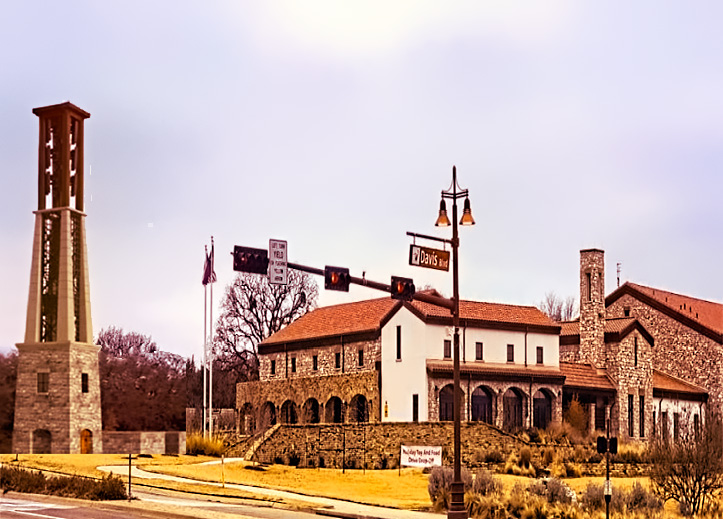
UNACCEPTABLY PLEASING? The Westlake Fire-EMS Station showcases an elegant Italian-inspired design with its four bays, fitting the aesthetic of Texas’s wealthiest town. The building’s exterior, a mix of rock and plaster finishes, has received acclaim for its distinctive approach to fire station architecture. In the rendering above, Vertical Bridge proposed a nearby telecommunications tower featuring a unique stealth design seamlessly integrated with the fire station’s limestone finish, mirroring its type, coursing, and size to complement the surrounding community. Despite the thoughtful design, Westlake’s Planning Commission denied the application.
If you reside in Westlake, Texas, you’re part of the wealthiest community in the state, where the average home sells for nearly $5 million, and the mean household income soars to $508,000. In this exclusive enclave, dandelions dare not blemish the meticulously manicured lawns; luxury is the norm. However, even in a town that Forbes once named the most affluent community in America, one surprising shortfall remains: reliable broadband coverage.
Despite its multi-million-dollar estates, parts of Westlake, particularly around Dove Road and Davis Boulevard, suffer from inadequate cellular and internet service. This issue has frustrated many homeowners in an area where high-end living is expected to come with all modern conveniences.
To address this problem, Vertical Bridge Development, LLC recently filed a lawsuit in the United States District Court for the Eastern District of Texas against the Town of Westlake and its Town Council. The lawsuit stems from what Vertical Bridge describes as an improper and arbitrary rejection of their application to build a wireless communications tower that would close a critical coverage gap in the area.
According to the lawsuit, the Town of Westlake’s denial of the application violates the Federal Telecommunications Act of 1996 (TCA) by effectively prohibiting improvements to cellular service. Vertical Bridge argues that the denial not only blocks three major national carriers from providing adequate telecommunications services but also fails to meet the TCA’s requirement for a decision “in writing and supported by substantial evidence.”
Vertical Bridge began working with the Town of Westlake back in 2018 to find a suitable site for the proposed tower. After years of discussions, the Town Council agreed in January 2022 to lease space at Fire Station Number 1 for the tower’s construction. In response to community feedback, Vertical Bridge even reduced the tower’s planned height from 150 feet to 130 feet. Despite this compromise and the council’s earlier agreement, the Town’s Planning Commission later recommended rejecting the application. The commission cited a lack of support and claimed that other coverage solutions hadn’t been sufficiently explored. However, the lawsuit notes that no viable alternative sites were presented during the hearing.
Vertical Bridge’s complaint outlines two key violations of the TCA:
- Effective Prohibition: The TCA prevents local governments from regulating the placement of wireless facilities in a way that inhibits the provision of wireless services. Vertical Bridge asserts that denying the application directly undermines carriers’ ability to provide improved service in Westlake, thereby violating this provision.
- Lack of Substantial Evidence: The TCA requires that any decision to deny construction of wireless facilities must be well-documented and based on substantial evidence. Vertical Bridge contends that the Town Council’s denial lacked detailed reasoning and was not based on sufficient evidence, breaching federal requirements.
Additionally, the lawsuit challenges the Town’s ordinance that restricts cell towers in non-residential areas to a maximum height of 80 feet. Vertical Bridge claims this limitation is impractical for addressing the existing coverage gap and effectively prohibits necessary telecommunications services, contravening federal law.
The company is seeking court intervention to:
- Declare that the Town’s denial is unsupported by substantial evidence and constitutes an effective prohibition under the TCA.
- Require the Town to approve the application for the proposed tower.
- Overturn the Town’s 80-foot height restriction ordinance, asserting it is preempted by federal law.
The case highlights a growing tension between the desire for modern telecommunications infrastructure and the strict zoning regulations of affluent communities. Vertical Bridge emphasizes that without the proposed tower, neither it nor the carriers it represents can provide the improved wireless services that Westlake residents increasingly require. The outcome of this lawsuit could set a precedent for how similar disputes are resolved in other high-income areas facing coverage gaps.


















